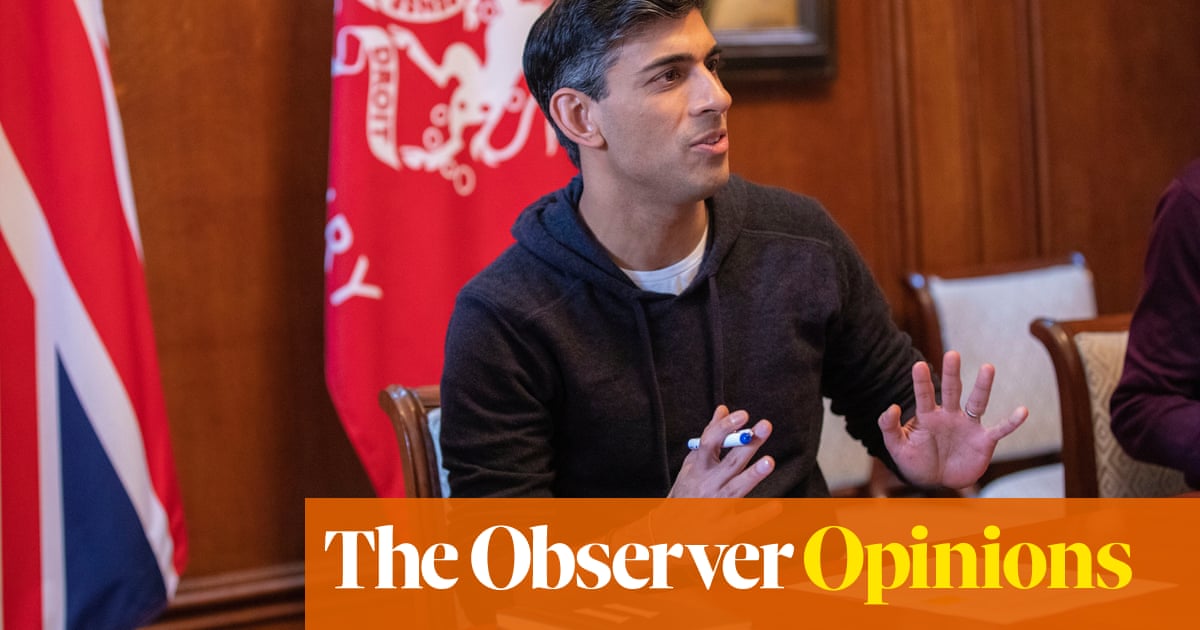Sunak’s ‘jam tomorrow’ offer won’t taste sweet in 2024 | Phillip Inman - 4 minutes read

The Chancellor Rishi Sunak preparing for his spring statement in 11 Downing Street The chancellor is keen to show he’s a tax cutter, but with war and the aftermath of Covid, who will believe his 1p reduction is in any way affordable?
Rishi Sunak has put in place one of the essential building blocks of a Tory victory at the next general election – a cut in income tax. During his Commons speech last week, the chancellor was cheered by backbench Conservatives, who believe the promise of a 1p cut in the basic rate to 19p before the likely date in 2024 would improve their chances of re-election.
But Sunak, always keen to portray himself as a tax cutter at heart, came in for ridicule once independent figures showed that the average household would pay more tax in two years’ time, even with the 1p reduction in place. That will be ensured by next month’s rise in national insurance contributions and a four-year freeze on personal tax thresholds, which means more earned income is subject to tax.
Never mind, say Sunak supporters, 1p is just the opening bid. Once the recovery from the pandemic is in full flow, and the inflationary spiral triggered by the Ukraine war has abated, a clampdown on public spending over a couple of years will allow for a 2p or even 3p cut.
In an increasingly uncertain world, it is understandable when hard-pressed families are tempted to vote against tax rises. When the government says there is little it can do to protect them and the businesses they work for, and uses its full might to denounce those who propose exploiting low interest rates to fund extra support by borrowing more, demands for lower taxes are expected to grow.
Only a few months ago, Sunak would have been forgiven for believing he would be leading the Conservatives into that election. The party’s tolerance of Boris Johnson’s persistent lying was growing thin and it seemed likely he would be ditched before the year was out.
Boris may still get the boot, but the chancellor cannot bank on it, and for the time being must sell his idea of jam tomorrow to a sceptical crew in No 10, keen to spend big now. He must also sell it to a sceptical public, one that cannot consider giving his party their vote in two years’ time while turning down the central heating today.
Sunak was given a helping hand last week by the Office for Budget Responsibility, the forecasting unit set up by one of his predecessors, George Osborne, to take the politics out of estimating the effect of government policy on the public finances and the economy more widely.
The OBR has faced criticism in the past for underestimating the impact of cuts to public services, public sector wages and welfare on the economy and on business confidence. Between 2010 and 2016 it consistently overestimated business investment growth, then was forced to review its calculations and admit that UK business investment – and productivity growth – had been hit for six by the 2008 crash.
In their most recent judgment, published with the chancellor’s spring statement last week, OBR officials were again chomping on the happy pills, arguing that worker productivity – measured as output per hour – was likely to grow by 1.3% on average.
This may not sound high, but compared with the 0.7% average growth rate in the decade after 2010, it is extremely optimistic. And when business investment has stayed at or close to zero for so long, it is difficult to see where the funding for such productivity growth will come from.
This year could be different. The OBR expects a major tax break on business investment to spark a 10% revival this year. But it is a one-off – as with so many of his government’s initiatives – and its effect will soon fade.
The OBR also expects consumers to override the uncertainty surrounding the end of the pandemic and the Ukraine war and start spending their savings. There could be as much as £150bn of the estimated £250bn built up during the pandemic left to spend.
Tombs says the OBR will be forced to revisit its forecasts and expects downgrades to be on the menu. That will spell disaster for a chancellor who has chosen to accept criticism for his parsimony today as a reasonable price for plaudits before the next election.
Source: The Guardian
Powered by NewsAPI.org